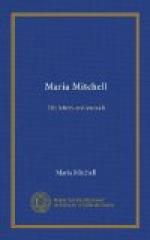“They plied me with questions: ’Do you have women in your faculty? Do men and women hold the same rank?’ I returned the questions: ’Is there a girl’s college in Moscow?’ ‘No,’ said the youngest sister, with a sigh, ‘we are always going to have one.’ The eldest sister asked: ’Do women vote in America?’ ‘No,’ I said. ‘Do women vote in Russia?’ She said ‘No;’ but her mother interrupted her, and there was a spicy conversation between them, in Russian, and then the mother, who had rarely spoken, turned to me, and said: ’I vote, but I do not go to the polls myself. I send somebody to represent me; my vote rests upon my property.’
“Have you not read a story, of late, in the newspapers, about some excellent women in a little town in Connecticut whose pet heifers were taken by force and sold because they refused to pay the large taxes levied upon them by their townsmen, they being the largest holders of property in the town? That circumstance could not have happened in barbarous Russia; there, the owner of property has a right to say how it shall be used.
“‘Why do you ask me about our government?’ I said to the Russian girls. ‘Are you interested in questions of government?’ They replied, ’All Russian women are interested in questions of that sort.’ How many American women are interested in questions concerning government?
“These young girls knew exactly what questions to ask about Vassar College,—the course of study, the diploma, the number of graduates, etc. The eldest said: ’We are at once excited when we hear of women studying; we have longed for opportunities to study all our lives. Our father was the engineer of the first Russian railroad, and he spent two years in America.”
“I confess to a feeling of mortification when one of these girls asked me, ‘Did you ever read the translation of a Russian book?’ and I was obliged to answer ‘No.’ This girl had read American books in the original. They were talking Russian, French, German, and English, and yet mourning over their need of education; and in general education, especially in that of women, I think we must be in advance of them.
“One of these sisters, forgetting my ignorance, said something to me in Russian. The other laughed. ‘What did she say?’ I asked. The eldest replied, ‘She asked you to take her back with you, and educate her.’ ‘But,’ I said, ’you read and speak your languages—the learning of the world is open to you—found your own college!’ And the young girl leaned back on the cushions, drew her mantle around her, and said, ’We have not the energy of the American girl!’
“The energy of the American girl! The rich inheritance which has come down to her from men and women who sought, in the New World, a better and higher life.
“When the American girl carries her energy into the great questions of humanity, into the practical problems of life; when she takes home to her heart the interests of education, of government, and of religion, what may we not hope for our country!




